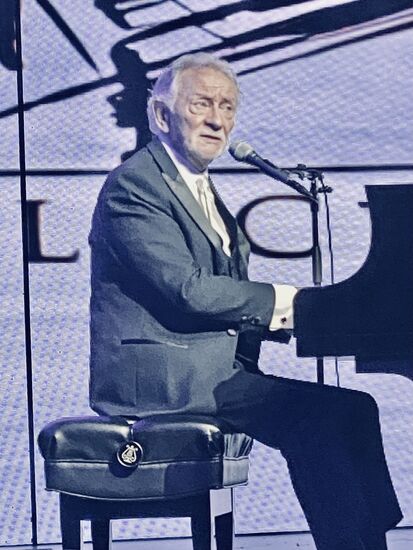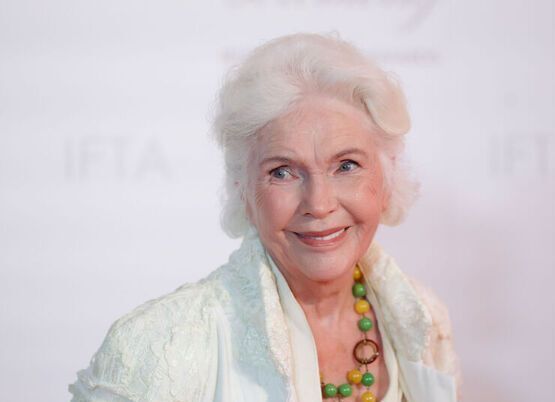the pillar
Nelson’s Pillar, seen here in 1927, was opened on Oct. 21, 1809. Its inner
stone staircase to the viewing tower was popular with visitors to Dublin.
By Honor Molloy
When I was 4, the IRA celebrated the semi-centennial of the Easter Rebellion by blasting Nelson’s Pillar to bits. As granite chunks thundered down on O’Connell Street, my father just happened to be passing by. He snatched up Lord Nelson’s sword, carried it home and hid it under our couch. I always thought he carried war home in that sword, because shortly after, our family was utterly shattered.
I got caught in the pitch and the tow of the Pillar Story. I’ve written about it over the years – an epic poem, a play, it’s the inciting incident of my autobiographical novel, “Smarty Girl – Dublin Savage.” Next Tuesday, March 8, marks the 50th anniversary of the bombing. Here’s a little taste for you.
-------
Screeping along O’Connell Street, the city swoops around: delivery boys on bikes too big for em brrr-ing, brrr-ing-ing their bells. News lads howling, “Hurr-uld n Press, Eeev-nin Hurr-uld n Press.”
Double decker buses with Baile Átha Cliath and Colún Nelson on their destination blinds. A ticket taker, leather pouch slung low on his hips like a cowboy’s gun, lets go of the pole at the back of the bus, drops to the street, as the bus squeals to a stop. And passengers step aground at the Nelson Column.
Me and Mam are caught in the hustle of the Nile Siders, them flower sellers trading in the dark shadow of Lord Nelly’s bum.
“Threepence the daffies,” the dealers call, singing out their flowerselling songs.
“Shamma-rocks and violets.” Smells like we’re inside a perfume bockle. “Get your shamma-rocks or Violets.”
There in the well of a bockety pram is clusters of purple and bunches of green.
“Howya, Noleen. Youse ready for Patrick’s day?” It’s Jacintha, twirling a shamrock tween finger and thumb.
“Can I’ve sixpence, Mam?”
Mam passes me her shiny green bag. Rooting through her bag for the spondoolahs – thinking: I could pay a visit to Lord Nelson, up-the-stairs. Only sixpence a go for “a splendid view,” the sign says. Going up Nelson is better than shamma-rocks, better than bumper cars, better-even than the zoo. Cause Lord Nelly stands in his magic kingdom in the sky. Inside the column is a thrilly mystery carnival ride. At the drop of a sixpence, click, you run up the spiral stairs to a lookout platform fenced in steel.
Locked up in a cage in the sky, press your nose to the grill, Dublin City spreads below. There’s the Happy Ring House bride and groom, Clery’s, the O Dearest Mattress shop. Wish I could have a lie-down on one of them mattresses, cause I am knackered.
“Do you want your shamrocks, Noleen?” Mam asks me.
“Piggers.” It’s a minute past three on Clery’s clock, too late to be shooting up the Pillar. “Course I want my shamrocks.”
Southside. The Pillar. Trafalgar on the granite base. At the double gates, the Pillar man is stamping, shifting foot to foot. Folding his long overcoat about himself in the March cold.
Lorries pound and engines gun. Hoot-hoot. Parp-parp. A motorbike screams to a stop at the Pillar’s gates. The rider’s wearing drainpipe trousers like a Teddy Boy. When he removes his crash helmet, out springs a mop of jumpy orange hair. It’s Boots, from the Cornerboys. His eyes is slicking side-to-side, on the lookout all the time.
At the taxi rank, there’s Paddy-the-Cabby parked in his cab. He hands the Pillar keeper an envelope thick with bills. “Here’s some money. For sweets.”
“Ta,” the keeper says, locking Boots inside the cast iron gates. Boots plunks down a pair of plaid carry-alls. One tips to the side, a burglar’s torch strikes the granite and rolls.
“Do all the divilments you want.” The Pillar man pushes a brass key through the bars. “But lock it on your way.”
Boots takes the Pillar man’s key. “Gunna sling it up his lordship’s hole.” Boots hauls his carry-cases over the turnstile and goes in for free.
The Pillar keeper lights a Kingsway, ambles straight up the city center, past The Nile Siders, Jacintha and her shamrocks, toward the Garden of Rememberies.
* * *
“It's all about. . .a pint of stout.” There’s Olly O’Feeney in the pub off the lobby in Dreams Hotel. Sitting in a snug jampacked with mentallers. Some are actors from his show at the Gate and some are Paddy-the-Cabby’s cabby friends. Everyone’s yapping on top of each other and all at once.
At the rail, Paddy calls in their order to yer man on the tap. “Eight pints of happiness. Keep the heads high.”
“Live life to the power of Guinness.” The barman slams down eight mugs, thick-foamy with cream.
Ah, there-Jeezuz, there’s that one, that Stacia-one. Chorus girl from the Black & White Dancers, an act in Olly’s show, “O’Feeney and the Cornerboys,” now playing at the Gate.
Stacia. Lookit that hair, wouldja. Piled high and teasy-teasy. She’s gotta ladder in her stockings, the left knee.
“You buying, Missus-Woman?” Olly says to her.
“Haven't two wax farthings.”
“Come sit with me, sit.”
“Leave off me.” Stacia, holding her breath like she doesn’t want to breathe his air, like she doesn’t want to be sucked back into his life.
There's a band taking over the place, marking off a bit of stage. A fiddler, piper, the son of a piper, one or two of the Cornerboys tuning up. Stilly Dunn, Battling Jake.
“There's a great pack a hoores in here tonight,” Stilly roars the crowd down. “I'm excirah, delirah and sweating. For tonight? Is capguns, fellaheens.”
“Tonight is the best St. Paddy’s prezzy in years,” Jake yells.
“For tonight? Is gelignite and ammonia.”
Jake steps to the mike. “Right-so, away we go now with Humpty Dumpty. He had a great what for himself?”
Banjey Jake cues the audience, lifting his round banjo. “Humpty Dumpty had a great . . .”
“Fallll.”
And they split the rafters with the most raucous tale of Humpty Dumpty ever told.
Olly O’Feeney steps on the bar-top, right arm rigged behind him, the flap of his sleeve tucked into his suit. There’s bottle caps sellotaped to his breast like brass medals. He carries a broom handle for a sword.
“I say-I say-I say, I am in need of a bevvie— Nay, four. And a pig chop.” He sketches along the counter. “I’ve not supped nor victualed in one hundred and fifty year.”
“Hey,” the barman shouts. “You can’t walk here.”
“I, my good man, can walk where I like.” Olly’s face pleated in a sneer. “For I am the illustrious Hoore-atio, Lord Nelson, Vice Admiral of the white, the blue, the orange, and the yellah. But you can call me the Nelse.”
“Off me counter.” The barman swats Olly’s shoes with a wet serviette.
The whole pub is slaughtered laughing.
“Don’t encourage him,” the barman says. “He’s a rattle.”
“Can’t you pour me a pint? After the bottles I’ve— Battles? After the battles I’ve been through—“
“I’ve gorra hand it to you, Nelsey—“
“You’re going to have to.” Olly’s voice slips back to Dublin. “For I’ve the one arm only. Lost me arr-um in the Nile, the willy in Leghorn, me upper teefs in Trafalgar. And fifty year ago?” Accusing the crowd with his broomstick sword. “Fifty bloody year ago, youse thricky, treacherous knaves shot off me nostril in your Easter Ree-belly-unn.”
Actor John Molloy posing with Nelson’s sword for a
newspaper report in the days following the explosion.
“Shut up,” the barman says. “And get down.“
Olly points the broom handle at the barman’s throat. “Just pull me a pint.”
“Never.”
“You and your vile crew can go to blazes.” Olly mock-trips over a mug on the counter. He pivots and kicks into a one-armed front handspring, landing on the sawdusted floor with a wee plié. He dips his head, a modest bow.
“If yer man can’t do that—” Olly says. “Leave him.”
“You should go on the telly, Olly.” Paddy-the-Cabby passes him a dinted flask. “I was falling in the toilet laughing.” Just then, Paddy catches sight of Boots groping toward the bar. “By the morto, he looks very shook.”
“Howya Boots,” Olly calls. “Get in here and tell us.”
“It’s done,” Boots manages.
“Right.” Paddy notes the time on his wristwatch. “Look after him.” Paddy signals the cabbies with a sharp whistle. “Time.” The taxi-men file out of the door.
On the bar top, a pint waits for Boots. He downs it in one greedy pull.
“Me nerves.” His voice dusky with fear. “Me bloody bared, baldy-bottomed nerves.”
“Yeh did it, Head.” Olly plucks the bottle caps off his suit jacket, lines em on the counter. “That’s what counts.”
“The Pillar at night is a haunted tomb. T’would wring the heart of a demon. I mean— I’d no trouble laying the charge, it was just— In the cage when the job was set, the notion came: I’m the last man ever to climb the Pillar.”
Olly tats two caps together like mini cymbals. Got his eye on Stacia in the corner, sipping a double rum.
“Didn’t the batteries on my torch run out. I’ve to go down in the dark alone. There was a sudden clapping of hands, the stench of water and dirt. A shrill moan coiled the length of column and there in the shadows of the window ledge, two gleaming golden eyes. I took breath and flogged it. But on each window ledge all the way, a pair of goldy-yellah eyes. Ghosty beasts watching me all the way down. Though I had a definite feeling they were urging me on, urging us into this night, this night-this— Historical night, never was I so happy to see the Pillar Man’s teapot on the bottom sill.”
Boots, nose in his third pint and draining, has aged twenty year this-night, this-night, this— Historical night.
* * *
“Let's go.” Olly steers Stacia to the lift. “You never told me why we aren't an item any more.”
“You are married.” Stacia picks at the ladder in her stocking, pulling the snag till it rolls up her leg. Her plumpskin bulges out in square cobbles all the way up, under her mini. “Tore me nylons.”
“No matter.” Olly reaches out and tears the stockings pure off her. Kissing in the lift, they're kissing into each other. Olly climbs inside the mouth of her, till the lift clunks to a stop on the rooftop. They pick their way past a jumble of cracked chimbelly pots and Guinness barrels to the building front. Olly places a hand on a brickwall, looks out over Dublin.
Anna Liffey snaking under the Butt Bridge, the Ha’penny. Taxi-men in their cabs at the ranks by the Pillar. Mods drifting from the ballrooms of Clery’s and the Metropole, dances long over. A pair of girls, arm in arm, giggle and sploother. When doesn’t Paddy swing his cab to a stop at Clery’s clock and beg them in. Their skirts, their legs, their high heels pull into the back seat. Car door slams, they zoom away.
A gull streaks up past Stacia and Olly standing in the rook of Dreams Hotel. And it's a clear arch of night, fair weathery. Moon at the last quarter. Sky, a goldy stutter of light, stars.
“Lookit, woudja,” Olly says, in perplexity. “The stars is not in place. The plough— Is plowing the wrong star-field tonight.”
Looking at the stars, Olly seems so young. Stacia melts a little. “The girls miss their new da. They ask for you every day. ‘When’s Olly coming, Ma? He’s so funny.’ They only adore you.”
Olly looks at her. Face still madeup from his show. One false lash bent upwards, eyeliner blotty. “I want the life of you, of us.”
“You've a wife, a life, other side the city.”
“This is my real life.” And for the moment Olly believes it. “You.”
He gives her a dancey twirl, wraps both arms round her.
Life is here. In your arms,” she says.
“Life is here. In me arms,” says he.
“Life is here,” they say.
Stacia’s studies yer man Nelson, his boots, breeches tight to the calves. When out on the end of her eyelash, the flash, and bang-shot, bang-bang shot out of the clear blue middle, an orange flame spurts, burrr-looms, punches skyward.
And the bombscream after, awfully tremen-juss. Sound-the-sound that’s no other. Sound that’s a fastkick. Godslam. A God-slamming-down bomb.
Bomb, the-bomb, a-rush a-raging— Ruirteach raging over Carlisle Bridge, Winetavern, the Midden piles. Past-and-past Trinity, up Kildare— By the Green, on into through: flats, shops, houses, all our homes.
Amliffy, Amplifee, Ampnlyffy.
A deluge of tumbling granite, Portland stone. Dublin’s toppling home to hell.
And Lord Nelson? Lord Nelson could fall.
He’s leaning into the tick-half of tock just after the hellslap, just fore the before. He’s listening, looks like, putting his ear nearer to near, when he goes wibble-wobble and Nelsey’s tossed head-down into the black.
There’s a second blam when his body hits the ground. That’s Nelson vanquished and the Pillar gone.
Stacia rushes down the stairwell, all the flights to the ground.
Olly’s on the pavement, jigging with glee. “He’s well away, the yellow beggar.”
“That was a bomb, Oliver. A bomb.”
“That was the spanker he deserved.”
“If you’d anything to do with this— Didja?”
Olly meets her eyes, says nothing.
“I’m going, you coming?”
O’Feeney looks away.
“I’ve home to get to my girls.” And Stacia, stilettos in her hands, runs barefoot up Parnell Square, off home.
O’Feeney stalks O’Connell Street. Pillar a stump. Broke stone everywhere, inches deep in snow-white dust.
There’s a lifeless head, a lifeless arm sticking out of the mound.
Death alive. Is that a body? Paddy and his cabmen was keeping things clear.
That is a man mid-the-road. Olly claws at the rubble. Kicks it, screams at it. When it suddenly stirs.
It’s a gray-haired, oldy fella spattered in blood. He’s cut and gashed in every part. His nose is gone. One eye, one arm— not there. His chest shot through, there’s the spine of him hanging, blue knobs of bone.
The Ould Fella is coughing out life, his last breath— but the wounds on his chest are mending-mending. He has clothes, not rags but peg-tucked trousers, and a waistcoat glinting with medals big as stars. His hair’s gone yellow, he’s come young.
“What’s this, two hands? I lost an arm— In the Nile? So long ago— But now I’ve two hands, two arms, two lips, two nostrils.”
He reaches into the cinders, pulls out a bicorne hat, hump in the middle like a camel. When he fits it on his head, it is clear. This is Lord Horatio Nelson, Vice Admiral of the Blue.
A red flush sweeps his face, life flows in the granite once again.
“Halloah.” Nelson’s on his knees, crawling down the stonecrop. “I say, fellow. Can you give me a hand?”
“But— You’re dead, been dead for a hungerud and fifty year.” Olly stumbles upon a cumberance on the ground, Nelson’s sword of solid brass. Olly heaves up the blade and clocks Nelson on the crown.
But Nelson just keeps walking. Olly cracks him and cracks him, but he’s a dragoon. He’s hell come up to strut the streets. He’s a monster loosed at the verge of day.
O’Feeney bursts him and bursts him, but nothing stops Old Lord Nelson. Fact, he gets bigger from each blackstab.
And no sound, save Nelson’s bootstrike on the drumlins, the troop of horse and four thousand feets. He goes and goes, swanks out of the skirling smoke, mounts O’Connell Bridge, past Nunnery Lane, the Croppy Hole. Over the living roads. Straight into, on into Ireland.
This extract from “Smarty Girl: Dublin Savage” was published with kind permission from Gemma Media.
Honor Molloy, center, pictured with actor-director Valerie Coyne, her nephew and actor Philip Coyne, and former trade union official Jimmy Kelly, on their visit to view the head of Nelson’s statue.











